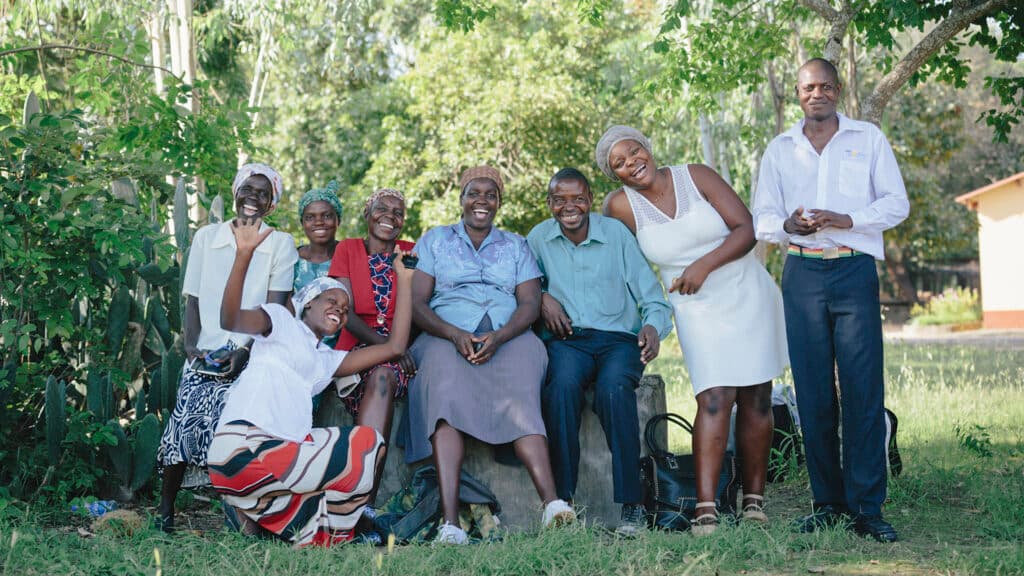
“You have to dress like a leader”
They were convinced they could represent the women in their neighbourhoods better than the men could, and Concilia Mlalazi and Tamani Moyo were successfully elected to the city’s highest-level council. This tough position requires the ability to challenge autocratic men.
Taking the floor as a woman in Zimbabwe is difficult in almost any context – in politics, it is even worse. But when Concilia Mlalazi and Tamani Moyo step into the office at Diakonia’s partner organization Women’s Institute for Leadership Development, WILD, it becomes clear that these are people with both strength and power. A steady gaze, a firm handshake, straight posture, zero bullshit.
Further perspectives emerge
Both women are councillors in the highest-level council in Bulawayo, Zimbabwe’s second-largest city. The council consists of 25 representatives of the city’s districts, and since the elections in 2013, eight of these have been women. A major step forward, as the more women there are on the council, the more perspectives see the light of day, according to Tamani Moyo.

“I competed with a man for the post of representative for my area, but he knows nothing of the problems that women face! I know what women have to deal with, day and night. I know that women are those who suffer most from poverty. The children don’t go to their father and say that they’re hungry – they go to their mother. The men disappear and then come home late in the evening.”
Tamani Moyo
Link to the people
Being a councillor involves tasks such as solving problems related to sewage and roads but also serving as the link between people in the area and the authorities.
“We tell people what the council has decided, and we launch programmes for women and young people in which they can develop and help themselves. The council also employs people to sweep the streets and helps them financially that way,” says Tamani Moyo.
The fact that Concilia Mlalazi and Tamani Moyo chose to stand for election a few years ago depended on support from the organization WILD; they were given training in leadership and took part in workshops on political participation.
“All the support made me feel like – what can stop me? But it wasn’t easy as a woman to campaign in my area. I didn’t have the resources necessary but went ahead anyway,” says Concilia Mlalazi.
Silly men in politics
It was a demanding campaign, and the women encountered powerful resistance. Supporters of their male opponents engaged in mudslinging campaigns, and the women are relatively sure that people were bribed to spread dirt about them. But they received sufficient support despite this, and both of them managed to get elected to the council. At the same time, their competence was called into question almost daily – by both men and women.
“It’s not always easy to get hold of the men to talk politics – because other women say that we’re chasing them. A lot of women drag each other down, and it’s so unnecessary.”
Concilia Mlalazi and Tamani Moyo find it hard to stop laughing when talking about how silly men in politics can be.
“The men don’t think that women can compete with them – they try to scare us and say that it’s not even worth standing for office. They say that we’ll embarrass the women in the district for letting their opinions be expressed – it’s so incredibly stupid.”
But with the sizeable demands made of women in politics, the two newly appointed councillors needed to change fairly radically in order to fulfil their new roles. It was hard at first, but WILD was behind them, supporting them in terms of both behaviour and purely practical issues.
Changed in many ways
“The way you dress is important, for example – you have to dress like a leader. We dress very formally. We learned how to talk in the council, how to eat correctly. We have books on how to behave as a woman politician,” laughs Tamani Moyo.
Concilia Mlalazi says that she has changed in other ways too; she has begun to respect people’s commitment and time more than people in Zimbabwe do in general.

“You can’t call a meeting if you have nothing to say – you have to prepare yourself and take things seriously,” says Concilia Mlalazi.
And even if it can be difficult to get things done sometimes due to the resistance they face from men in power, they have achieved a great deal during the years on the council, and they know they are good representatives for their areas.
“For example, I’ve extremely proud of the vulnerable people I’ve employed. Previously, they were unable to give their children food – now they have freezers and TVs and their children go to school. That feels fantastic,” says Tamani Moyo.

Diakonia's work in Africa
Diakonia works in several African countries, where we have country offices in most of them. The work is coordinated from our regional office in Nairobi, Kenya.